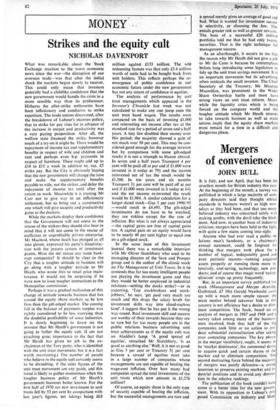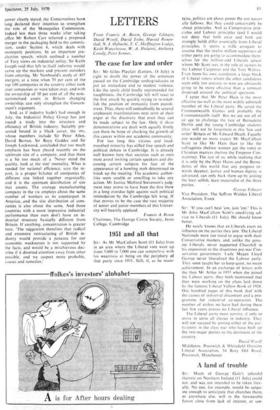Mergers of convenience
JOHN BULL
It is July, and not April, that has been the cruellest month for British industry this year.
At the beginning of the month, a survey was published in which a large majority of com- pany directors said they thought ethical standards in business weren't as high now- adays as they had been, and that too many believed industry was concerned solely with making profits, with the devil take the hind- most. And now, in another bout of industrial criticism, mergers have been held to the light, with quite a few stains coming into sight.
Anyone who had ever read a public re- lations man's handouts, or a chairman's annual statement, could be forgiven for thinking that mergers took place for a number of logical, indisputably good and even patriotic reasons—running acquired assets properly or running them more in. tensively, cost-saving, technology, new pro- ducts; and of course that magic word 'ration• alisation' crops up pretty frequently.
But, in an important survey published last week (Management and Merger Activity, Guthstead, £3 10s) Gerald Newbould came up with a much more simple reason: the main motive behind takeover bids in this country is not efficiency but a desire to elim- inate competition. The book, based on an analysis of mergers in 1967 and 1968 and a survey taken among many of the business- men involved, finds that half of the big companies took little or no action to pro- duce substantial rationalisation after taking over competing companies. The key phrase in the merger vocabulary, ought, it seems. to be 'market dominance', the communal desire to acquire quick and certain shares of the market and to eliminate competition. The second motivating force behind the majority of mergers was purely defensive—a strong intention to preserve existing market and In- dustrial positions and to avoid_any diminu lion in the relative rankings.
The publication of the book couldn't have come at a better time for the new govern-
ment. With its opposition to Labour's pro- posed Commission on Industry and Man•
power clearly stated, the Conservatives have long declared their intention to strengthen the role of the Monopolies Commission. Indeed less than three weeks after taking office Mr Robert Carr referred a proposed merger in the packaging field to the commis- sion, under Section 6, which deals with monopoly positions. In an important pre- election speech, which outlined a number of Tory views on industrial policy, Sir Keith Joseph said that left to itself industry would carve up the markets and prevent outsiders from entering. Mr Newbould's study of 407 mergers, at a time when 70 per cent of the top 100 companies in the country either took over companies or were taken over, and with the ownership of 10 per cent of all the non- nationalised assets in Britain changing ownership, can only strengthen the Govern- ment's argument.
And, as if industry hadn't had enough in July, the Industrial Policy Group has just issued a study into the structure and efficiency of British industry. Suitably pre- sented bound in a black cover, the IPG, whose members include Sir Peter Allen, David Barran, Sir Reay Geddes and Sir Joseph Lockwood, concluded that too much emphasis has been placed recently on the optimum size of a company, and that there is a bit too much of a 'Never mind the quality, look at the size' mentality. What is needed for national efficiency, says the re- port, is a proper balance of companies of different size linked together organically, and it is the optimum distribution of size that counts. The average manufacturing company in the tac employs about the same number of workers as its counterpart in America, And the size distribution of corn- panies is also about the same. And those countries with a more impressive industrial performance than ours don't have an in- dustrial structure basically different from Britain. if anything, concentration is greater here. The suggestion therefore that radical and extensive restructuring of British in- dustry would provide a panacea for our economic weaknesses is not supported by the facts, and would be a mischievous doc- trine if it diverted attention away from other possible, and we suspect more- probable, causes and remedies.'
ffolkes's investors' alphabet is for After hours dealing































 Previous page
Previous page